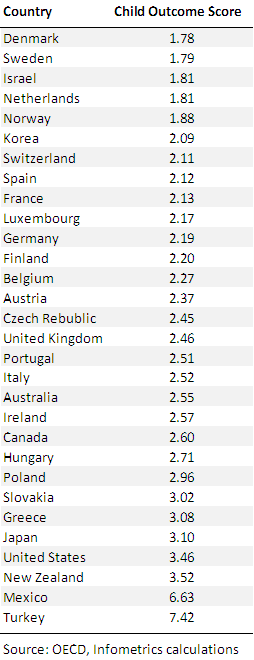We are failing our children, and ourselves
To what extent should society contribute to the upbringing of the children of others? Some people will have the perspective that the upbringing of children should be entirely the domain of the children's parents and extended family. However, this is not the way that modern societies work. A considerable proportion of government spending is devoted to the education, health and welfare of children. Thus the pertinent question is not "should society contribute" but instead what is the appropriate point where the responsibility lies entirely with the family and when and how should society step in to assist families raising children?
Public spending typically increases as children get older. According to the 2009 OECD report, Doing Better for Children, New Zealand public spending on each school aged child (6 to 17) is typically 2½ times greater than that spent on children aged under 6. The paradox is that this emphasis is the reverse of the modern understanding of when public support is most effective. A child who is well nurtured prior to school is more likely to have the physical, mental and social prerequisites for school achievement. Conversely children who begin school with health, learning or social disadvantages are worse placed to benefit from their school lessons. As skill begets skill; learning begets learning. Early disadvantage, if left untreated, can lead to academic and social difficulties in later years. Advantages accumulate; so do disadvantages.
- There is a growing consensus on the key policy foundations for improving child wellbeing:
- invest early in children's lives;
- concentrate on improving the lot of vulnerable children;
- design interventions for children that reinforce a range of positive lifetime outcomes;
- create clear, achievable targets for child well-being outcomes;
- regularly collect high-quality information on children's well-being;
- governments should continuously experiment with policies and programmes for children, rigorously evaluate them to see whether they enhance child well-being, and reallocate money from programmes that don’t work to those that do.
There is also a growing recognition of the merit of this prescription in New Zealand. Indeed, such sentiment underpinned much of the report on adolescence produced this year by the Prime Minister's Science Advisory Committee. Although intellectual agreement is an important first step, considerably more effort is required in order to make a material difference for many children in New Zealand.
The 2009 OECD report, Doing Better for Children collected up to twenty measures of child outcomes from thirty OECD countries. The types of outcomes covered were factors such as housing conditions, education outcomes, and teenage rates of smoking, suicide and pregnancy. In a report that I recently prepared for Every Child Counts I used this data to create a summary international comparison of child outcomes. These results are reproduced in the table.
The measure is a relative outcome measure with a lower score indicating better average outcomes for children. As the scores are relative measures, the results indicate that New Zealand child outcomes are typically almost twice as bad as those obtained in the best performing country, Denmark (3.52/1.78 = 1.98). Although child outcomes in New Zealand are also roughly twice as good as apparent in Mexico and Turkey, the net implication is that New Zealand scores quite poorly in terms of child outcomes.
To some degree differences in child outcomes reflect differences in the relative wealth of different countries. But even taking these differences into account does not absolve us from the perception that were failing many of our children. In particular, my analysis would suggest that child outcomes would be materially improved by refocusing public support towards pre-school aged children. Public money spent on children aged under six appears to have three times the impact on improving overall child outcomes than is achieved with the current mix of public spending on children. There also appears to be considerable scope for improving child outcomes by targeting public spending towards more effective interventions and programmes.
But why should we care? Why should we contribute to the wellbeing of children from families we do not know and may never meet? I could appeal to your sense of morality and altruism, but there are also sound economic reasons for wanting better child outcomes. Early childhood interventions are more effective and considerably cheaper than the remedial costs that result from poor child outcomes. Children with poor school, health and social outcomes will not only have poorer personal outcomes but will also contribute less to society (due to lower potential earnings) and be more likely to impose drain on public resources through a higher use of the public health, welfare, and justice systems. Spending wisely now on improving the prospects of vulnerable children will pay dividends in the future through a greater capacity to fund superannuation and reducing the need for our children to provide support for dysfunctional groups of their peers.
To view the full report discussed in this article please visit: http://www.everychildcounts.org.nz/resources/
Table: Relative Average Outcomes for Children in OECD Countries
